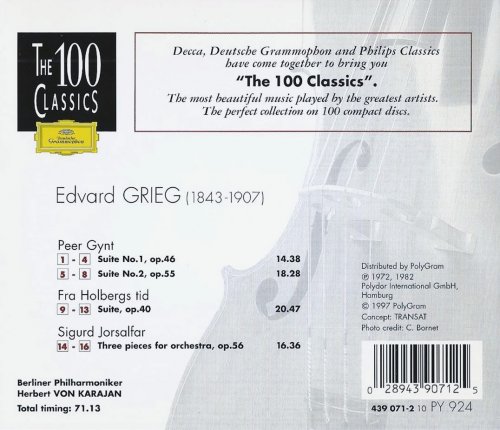
Berliner Philharmoniker, Herbert von Karajan - Grieg: Peer Gynt (1997)
BAND/ARTIST: Berliner Philharmoniker, Herbert von Karajan
- Title: Grieg: Peer Gynt
- Year Of Release: 1997
- Label: Deutsche Grammophon
- Genre: Classical
- Quality: FLAC (image+.cue,log,scans)
- Total Time: 71:13
- Total Size: 305 Mb
- WebSite: Album Preview
Tracklist:
Edvard Grieg (1843-1907)
01. Peer Gynt Suite No. 1, Op. 46: I. Morgenstimmung [0:04:02.37]
02. Peer Gynt Suite No. 1, Op. 46: II. Aases Tod [0:04:48.38
03. Peer Gynt Suite No. 1, Op. 46: III. Anitras Tanz [0:03:46.50]
04. Peer Gynt Suite No. 1, Op. 46: IV. In Der Halle Des Bergkönigs [0:02:11.50]
05. Peer Gynt Suite No. 2, Op. 55: I. Der Brautraub [0:04:56.25]
06. Peer Gynt Suite No. 2, Op. 55: II. Arabischer Tanz [0:04:41.00]
07. Peer Gynt Suite No. 2, Op. 55: III. Peer Gynts Heimkehr [0:02:44.00]
08. Peer Gynt Suite No. 2, Op. 55: IV. Solvejgs Lied [0:06:23.50]
09. Aus Holbergs Zeit Suite, Op. 40: I. Praeludium. Allegro Vivace [0:02:56.50]
10. Aus Holbergs Zeit Suite, Op. 40: II. Sarabande - Andante [0:04:16.12]
11. Aus Holbergs Zeit Suite, Op. 40: III. Gavotte. Allegretto - Musette. Un Poco Mosso - Gavotte [0:03:49.38]
12. Aus Holbergs Zeit Suite, Op. 40: IV. Air. Andante Religioso [0:05:51.25]
13. Aus Holbergs Zeit Suite, Op. 40: V. Rigaudon. Allegro Con Brio [0:04:02.25]
14. Sigurd Jorsalfar Drei Orchesterstücke, Op. 56: I. Vorspiel Zum II. Akt [0:03:46.12]
15. Sigurd Jorsalfar Drei Orchesterstücke, Op. 56: II. Intermezzo(Borghilds Traum) [0:03:15.63]
16. Sigurd Jorsalfar Drei Orchesterstücke, Op. 56: III. Huldigungsmarsch [0:09:40.50]
Performers:
Berliner Philharmoniker
Herbert von Karajan - conductor

Edvard Grieg (1843-1907)
01. Peer Gynt Suite No. 1, Op. 46: I. Morgenstimmung [0:04:02.37]
02. Peer Gynt Suite No. 1, Op. 46: II. Aases Tod [0:04:48.38
03. Peer Gynt Suite No. 1, Op. 46: III. Anitras Tanz [0:03:46.50]
04. Peer Gynt Suite No. 1, Op. 46: IV. In Der Halle Des Bergkönigs [0:02:11.50]
05. Peer Gynt Suite No. 2, Op. 55: I. Der Brautraub [0:04:56.25]
06. Peer Gynt Suite No. 2, Op. 55: II. Arabischer Tanz [0:04:41.00]
07. Peer Gynt Suite No. 2, Op. 55: III. Peer Gynts Heimkehr [0:02:44.00]
08. Peer Gynt Suite No. 2, Op. 55: IV. Solvejgs Lied [0:06:23.50]
09. Aus Holbergs Zeit Suite, Op. 40: I. Praeludium. Allegro Vivace [0:02:56.50]
10. Aus Holbergs Zeit Suite, Op. 40: II. Sarabande - Andante [0:04:16.12]
11. Aus Holbergs Zeit Suite, Op. 40: III. Gavotte. Allegretto - Musette. Un Poco Mosso - Gavotte [0:03:49.38]
12. Aus Holbergs Zeit Suite, Op. 40: IV. Air. Andante Religioso [0:05:51.25]
13. Aus Holbergs Zeit Suite, Op. 40: V. Rigaudon. Allegro Con Brio [0:04:02.25]
14. Sigurd Jorsalfar Drei Orchesterstücke, Op. 56: I. Vorspiel Zum II. Akt [0:03:46.12]
15. Sigurd Jorsalfar Drei Orchesterstücke, Op. 56: II. Intermezzo(Borghilds Traum) [0:03:15.63]
16. Sigurd Jorsalfar Drei Orchesterstücke, Op. 56: III. Huldigungsmarsch [0:09:40.50]
Performers:
Berliner Philharmoniker
Herbert von Karajan - conductor

These recordings from 1982 present three Scandinavian works, the two Peer Gynt Suites by Grieg and Pelléas et Mélisande by Sibelius played by the Berlin Philharmonic Orchestra conducted by Herbert von Karajan, 1908-89. Karajan had recorded the Peer Gynt Suites with the same orchestra in 1972. The music evokes impressionistic-surrealist moods associated with literary works by Henrik Ibsen, 1828-1906, and Maurice Maeterlink, 1862-1949.
Grieg's wrote incidental music for the first performance of Ibsen's verse-drama in Oslo in 1876 and later organised 8 of the 23 various musical numbers into the two concert Suites. The more familiar First, op. 46, comprises ‘Morning Mood’, ‘Aase’s Death’, ‘Anitra’s Dance’ and ‘In the Hall of the Mountain King’, the Second, op. 55, contains ‘The Abduction of the Bride’, ‘Arabian Dance’, ‘Peer Gynt’s Return Home’ and ‘Solveig’s Song’.
The musicality of the contrasting movements in the two suites is very well presented by Karajan, although perhaps just a tad too measured and impersonal, whilst the performance of the orchestra, including the triangle in ‘Anitra’s Dance’, could hardly be bettered. ‘Morning Mood’ is painted in impressionistic colours and the dynamic range is most evident in the final movement of the First Suite, so beloved of school ‘music and movement’ activity. The exoticism of ‘Anitra’s Dance’ and ‘Arabian Dance’ are both sensitively played without the excessive sentimentality that sometimes spoils performances. If Karajan does not quite match Beecham, who recorded the incidental music in 1958 with the Royal Philharmonic Orchestra, it is because he lacks the sparkle that is the essence of the English conductor’s performance.
In 1905 Sibelius wrote incidental music for Maeterlinck’s play ‘Pelléas et Mélisande’. Originally scored for a small orchestra of no more than 30 players most of the music was retained in the Suite, op. 46, and is here played by Karajan’s lush Berlin Philharmonic Orchestra. The opening movement, ‘At the Castle Gate’ is for ever associated with the brooding presence of Patrick Moore’s ‘The Sky at Night’, which used Beecham’s recording as its opening and closing music. However, thereafter, Karajan creates a darkly atmospheric symphonic poem that emphasises its symbolist associations. ‘By the Sea’ has rarely sounded so shadowy whilst ‘Mélisande’s Death’ balances hope and sadness in an utterly convincing manner.
The sound is first-class in both the larger scoring of the Sibelius and the more intimate Grieg whilst the transfers retain the overall balance. The leaflet contains a brief text by Anthony Burton and photographs of Sibelius, Grieg and Karajan. The illustration on the cover, “Padres Bay” by the American painter and screenprinter Jerome Shurrs, b. 1940, beautifully complements the music.
This is one of Karajan’s most impressive CDs.
Grieg's wrote incidental music for the first performance of Ibsen's verse-drama in Oslo in 1876 and later organised 8 of the 23 various musical numbers into the two concert Suites. The more familiar First, op. 46, comprises ‘Morning Mood’, ‘Aase’s Death’, ‘Anitra’s Dance’ and ‘In the Hall of the Mountain King’, the Second, op. 55, contains ‘The Abduction of the Bride’, ‘Arabian Dance’, ‘Peer Gynt’s Return Home’ and ‘Solveig’s Song’.
The musicality of the contrasting movements in the two suites is very well presented by Karajan, although perhaps just a tad too measured and impersonal, whilst the performance of the orchestra, including the triangle in ‘Anitra’s Dance’, could hardly be bettered. ‘Morning Mood’ is painted in impressionistic colours and the dynamic range is most evident in the final movement of the First Suite, so beloved of school ‘music and movement’ activity. The exoticism of ‘Anitra’s Dance’ and ‘Arabian Dance’ are both sensitively played without the excessive sentimentality that sometimes spoils performances. If Karajan does not quite match Beecham, who recorded the incidental music in 1958 with the Royal Philharmonic Orchestra, it is because he lacks the sparkle that is the essence of the English conductor’s performance.
In 1905 Sibelius wrote incidental music for Maeterlinck’s play ‘Pelléas et Mélisande’. Originally scored for a small orchestra of no more than 30 players most of the music was retained in the Suite, op. 46, and is here played by Karajan’s lush Berlin Philharmonic Orchestra. The opening movement, ‘At the Castle Gate’ is for ever associated with the brooding presence of Patrick Moore’s ‘The Sky at Night’, which used Beecham’s recording as its opening and closing music. However, thereafter, Karajan creates a darkly atmospheric symphonic poem that emphasises its symbolist associations. ‘By the Sea’ has rarely sounded so shadowy whilst ‘Mélisande’s Death’ balances hope and sadness in an utterly convincing manner.
The sound is first-class in both the larger scoring of the Sibelius and the more intimate Grieg whilst the transfers retain the overall balance. The leaflet contains a brief text by Anthony Burton and photographs of Sibelius, Grieg and Karajan. The illustration on the cover, “Padres Bay” by the American painter and screenprinter Jerome Shurrs, b. 1940, beautifully complements the music.
This is one of Karajan’s most impressive CDs.
Classical | FLAC / APE | CD-Rip
As a ISRA.CLOUD's PREMIUM member you will have the following benefits:
- Unlimited high speed downloads
- Download directly without waiting time
- Unlimited parallel downloads
- Support for download accelerators
- No advertising
- Resume broken downloads


